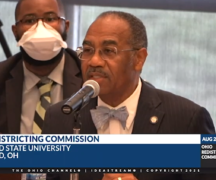BY SUSAN TEBBEN
A second multi-million dollar influx of federal funding will be coming to public transit authorities throughout Ohio via an infrastructure bill passed earlier this year.
The biggest portion of the funding, more than $65 million, will be headed to Cleveland, according to a listing of federal transit apportionments for the state.
Dayton’s transit will receive $41 million, nearly $30 million is headed to Cincinnati and $28 million will go to Columbus’ transit operations, among the “large urban area funding.”
U.S. Sen. Sherrod Brown, D-Ohio, is the chair of the Senate Banking, Housing and Urban Affairs Committee, and said the investment will help with job creation and investment throughout the state.
“Transit is all about the dignity of work,” Brown said in a statement. “It creates jobs, it connects people to jobs, it draws in investment and it will help communities across Ohio grow and create opportunity.”
Ohio is set to receive more than $1 billion in transit formula funding over the next five years, according to Brown’s office. A total of $259 million has been released specifically for Ohio over the last year by the U.S. Department of Transportation.
The transit funding is part of the Infrastructure Investment and Jobs Act, and bill meant to address the health of the country’s roads and bridges, along with its public transit.
Bridge formula funding under the bill brought direct funding and competitive grants to the Ohio Department of Transportation, along with local city/county engineers for long-awaited maintenance.
Brown said in January that he wanted to see the money improve big bridges in the state, including the Brent Spence Bridge crossing the Ohio River to Kentucky. The National Association of Manufacturers said the bridge carries freight equivalent to 3% of the U.S.’s gross domestic product.
***
Also from Ohio Capital Journal:
Lawmakers send governor bill to deregulate construction over ephemeral streams
The Ohio General Assembly passed legislation Wednesday that relaxes regulations around the development of ephemeral streams, which flow only by way of rain and snowmelt.
There are more than 36,000 miles of ephemeral streams in Ohio, according to legislative testimony from the Ohio Environmental Protection Agency. They channel water into larger streams and can filter out contaminants like nitrogen and phosphorus, which cause algal blooms.
Under current Ohio law, developers must obtain a permit to dredge or fill in any ephemeral feature, according to analysis from the Legislative Service Commission. Environmentalists say these permits, often paired with requirements to mitigate any environmental damage, are a key means to protect Ohio’s waterways. Developers say they’re expensive and onerous.
House Bill 175 would remove these permitting requirements for “ephemeral features” that are not covered by EPA rules under the federal Clean Water Act of 1972.
The bill passed the House nearly along party lines. Two Republicans — Haraz Ghanbari (R-Perrysburg) and Reggie Stoltzfus — voted with Democrats in opposition. It cleared the Senate last month on party lines with Republicans in support. READ MORE
Lawmakers could soon pass bill blocking Ohio cities from outlawing carrying knives
An Ohio House committee passed legislation Thursday that would block cities from passing local laws restricting whether people can carry switchblades and other knives within their borders.
The legislation passed the Senate in October in a party line vote with Republicans in support. It can now proceed to the House floor for a final vote before going to the governor for approval or veto. If passed, the state alone would control what kind of knives people can carry. State Senator Theresa Gavarone, R-Huron, is a co-sponsor of the bill.
It follows legislation enacted last year allowing people in Ohio to carry an array of concealed knives and other similar weapons including brass knuckles, cestuses, billy clubs, blackjacks, sandbags, switchblade knives, springblade knives, gravity knives, and others. That law took effect last year.
Knife Rights, an advocacy organization that supports the bill, provided lawmakers with a list of Ohio cities with knife regulations on the book. READ MORE
That’s privileged: Medicaid won’t say what it did to justify denying records
The Ohio Department of Medicaid is denying public access to oversight reports submitted by its billion-dollar managed-care contractors. But it won’t describe the process it used in determining that information in the reports qualifies as trade secrets.
That information is privileged, said a spokeswoman for the department, which claims to value transparency.
Even though some other state departments of Medicaid publish them on their websites, the Ohio’s Department of Medicaid last month declined to provide the Capital Journal with copies of “medical-loss ratio” reports in response to an open records request.
Managed-care contractors are required by the federal government to produce such reports to keep tabs on how much taxpayer money the companies are spending on healthcare, and how much they’re pocketing in the form of profit and administrative expenses.
Even though the reports are meant to keep tabs on contractors — each of which gets more than $1 billion a year from the Medicaid department — it appears that the department let those companies decide to keep them secret.
“Please note that the managed care organizations have identified that the reports are proprietary information and trade secrets under ORC 1333.61,” the department’s legal staff wrote in response to the records request. “As such, we are denying your request.” READ MORE





